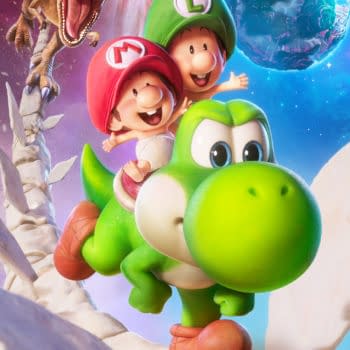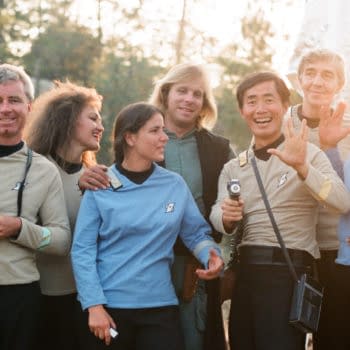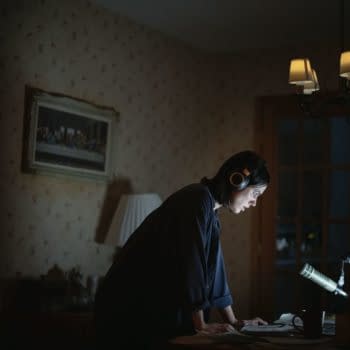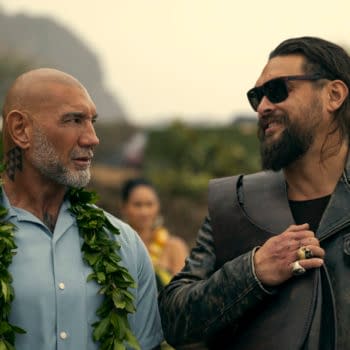Posted in: Movies | Tagged: Barrack Obama, cnn, Comics, donald trump, entertainment, marvel, politics, Sebastian Shaw, The Dream Corps, Van Jones, x-men
How Comics Have Influenced Politics With Van Jones Part 1

Jones has an interesting background. He is a Yale-educated attorney, author of two New York Times best-selling books, The Green Collar Economy (2008) and Rebuild the Dream (2012). He was the main advocate behind the Green Jobs Act signed into law by George W. Bush in 2007 and he was a Green Jobs adviser to Barack Obama in 2009. Jones has founded and led multiple social and environmental justice enterprises including: The Ella Baker Center For Human Rights, Color of Change, Rebuild the Dream and The Dream Corps. One of the initiatives the Dream Corps is behind is called #YesWeCode that trains low-opportunity youths to become computer programmers.
Mr. Jones and I spent close to an hour on the phone last week talking about his early days growing up with comics book, the effects they had on him and other in politics and of course the current presidential race. This first part focuses on the effect of comic books during his childhood.
DAN WICKLINE: In doing my research I found a quote from your sister claiming you grew up as a stereotypical geek. What were you into as a kid? Was it comics, Star Wars? What got your attention back then?
VAN JONES: I made Urkel look really cool. I was as geeky as geeky could be. I weighed 89 lbs in the 9th grade and my glasses were probably a good 1/10th of that. For me it was all Marvel Comics all the time. Star Wars of course, not so much Star Trek, but Star Wars of course. And lots and lots of science fiction. Ursula K. Le Guin and I loved Hitchhiker's Guide to the Galaxy. I was basically hiding in my room reading stuff, hoping at some point I would be big enough to brave the bullies outside the neighborhood. Now I'm 6'2".
DW: You and I are close to the same age so we grew up with the same comics and fandoms. I know, for me, that the Marvel comics had a big influence on how I saw the world with how often they touched upon the social issues of the time. How much do you think those comics influenced your outlook and your belief system now?

Also the idea that no matter how hard it gets you don't quit. You don't give up. You push on and you expect that somehow in the final pages there will be some kind of epiphany or miraculous outcome. I still feel that way. I take on a lot of tough issues, like I'm working on the Flint Water Crisis right now, and I believe that pluck makes luck and that's a theme in a lot of Marvel comics. I live by that and by "With great powers comes great responsibilities", I feel very fortunate and blessed in my life to get a good education and gotten off to a good start.
DW: Over the last few years it seems more and more politicians have talked about reading comic books growing up. President Barrack Obama is a fan of Spider-Man and Conan, Ted Cruz included Rorschach from the Watchmen as one of his top five favorite characters, and current Supreme Court nominee Merrick Garland is said to have sold his comic collection to afford law school. Do you think that we're hearing more about stuff like this because of how much more comics are accepted into the mainstream now or do you think the folks who are now becoming politicians were more influenced by the books they were reading growing up?
VJ: I think it's a mix, but comics books are about people with special gifts who use them for public purpose. They're not about people with special gifts using them to get rich. Characters like Reed Richards, Tony Stark and Bruce Wayne are rich but it is secondary to their genius and fortunes being put towards public purposes and dealing with public crises. That lays a certain neurological track in your mind when you're a kid almost subconsciously. That if you have any gifts you should use it that way. I think that is significant. I also thing that politics in particular and law are literary forms, you use words as your weapons and Marvel Comics was shoving polysyllabic words into the brains of eight and eleven year olds every month. Stan Lee never worried that a kid would have to go get a dictionary to figure out what was going on and I think that is a factor. You're reading a lot, you're reading big words and you're dealing with big adult themes. You watch your heroes step into the breech and I think that has a big impact in terms of what you think you should do.
DW: Do you read the comics being published today?
VJ: Not as much as I would like. There are so many changes and so much going on in the world of comics and the Marvel Cinematic Universe is the same in some ways and quite different in others that sometimes it just really hard to jump into a series and know what the heck is going on. And with there being so many X books that I've found over time that it's hard to catch up and keep up. And some of these books are a lot darker than they use to be, which is good and bad. When I take my kids to a comic book store they're not very interested. They think of these characters as cartoon or movie characters. Their primary relationship with these characters are through video games, cartoons and movies. When they read they want to read about the characters they only have access to through reading. I wonder sometimes if comic books will be left behind by the characters.
DW: You think that they will grow so much in these other mediums that where they came from won't matter anymore?
VJ: Yeah, that's my concern. I have an 11-year-old boy and a 7-year-old boy and I feel like my dad trying to get them to read these comics or knowing and appreciating Michael Jackson or Prince. I can remember my dad with these LPs of Sly and the Family Stone and Bob Dylan and he had to push me to give them a chance. I'm so glad he did. But I feel that same thing telling my sons, "this is really good stuff, guys." My oldest boy told me, "for you comics books were very exciting, for us video games are very exciting, for our kids virtual reality will probably be very exciting and they won't think that iPads are very cool." That was him explaining to me how evolution works.
I get emotional about this, but I don't know what would have happened to me if I hadn't had my comic books. I really don't.
Tomorrow will be part 2 of the interview focusing on the effects comics has had on society and the political world.
Photos take from www.vanjones.net














